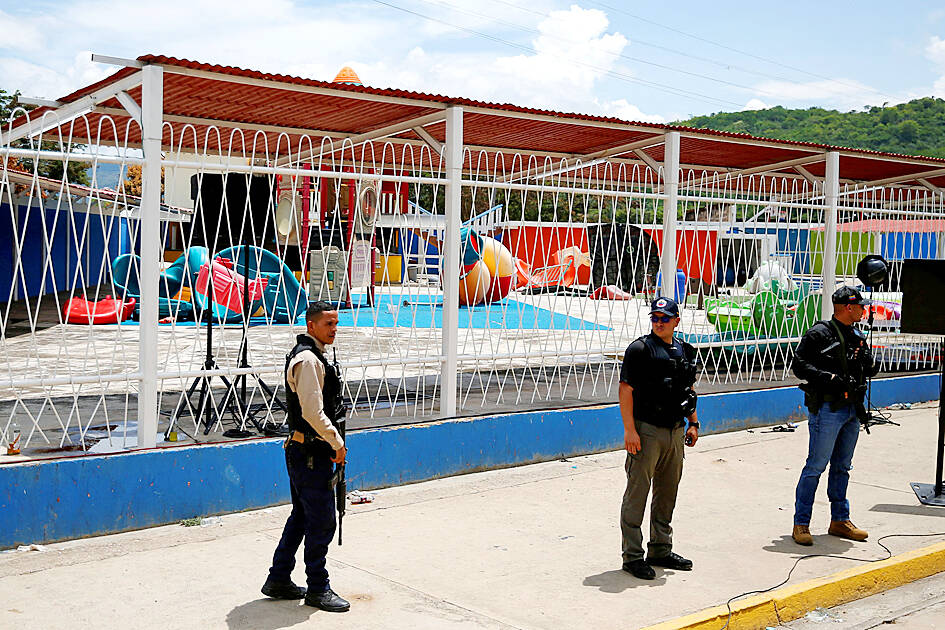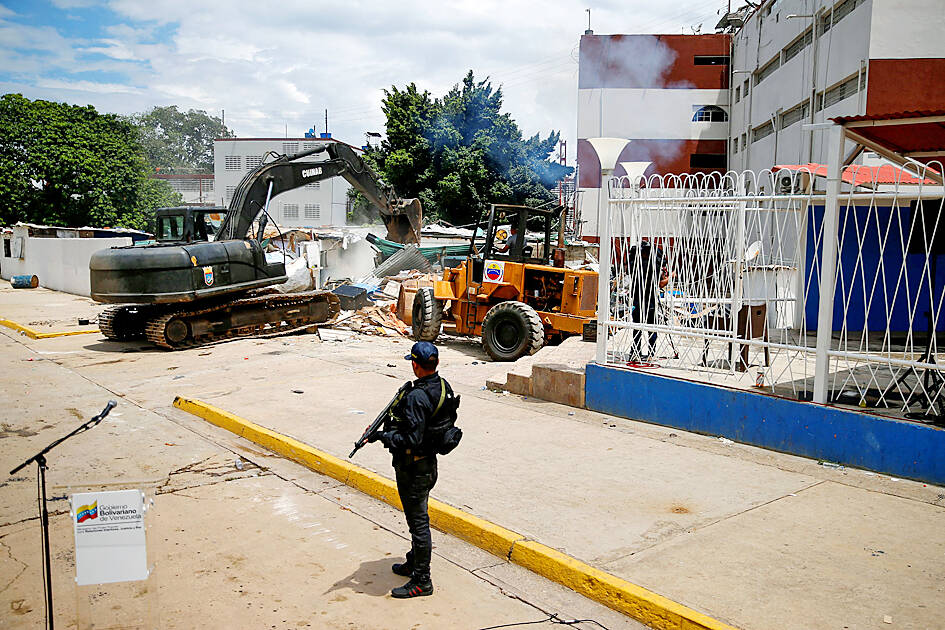Venezuela’s Tocoron prison was like a town all unto itself, boasting restaurants, a pool, a zoo, a playground for inmates’ kids and so much more as a powerful gang ruled the roost, using the facility as a criminal operations center.
“Steak House. Enjoy,” read a sign on the wall of one of the restaurants in the prison, which thousands of soldiers and police stormed this week.
Tocoron is empty of the 1,600 prisoners who lived here and have been moved elsewhere. Gone is the gang that controlled it — Tren de Aragua, which has tentacles in various Latin American countries.

Photo: Reuters
“Life was nicer and safer in prison than out on the street,” said the wife of a prisoner transferred elsewhere, declining to give her name.
Venezuelan authorities on Saturday took a group of journalists on a controlled and limited tour of the prison.
The reporters did not get to see the concrete tunnels that the prisoners dug — pictures of them are circulating on social media — or what is left of the zoo with its pink flamingos.

Photo: Reuters
On one door is written “GNB: the train has stopped.” That is the acronym of the Venezuelan National Guard, and train refers to the gang. That was a message aimed at the visiting journalists, but which the government is also presumably trying to spread nationwide amid the embarrassment of having a gang running a prison and living in relative luxury.
Venezuelan Minister of the Interior Admiral Remigio Ceballos has said that four prison officials had been arrested and charged with complicity with the criminals.
The Tren de Aragua, which reportedly has 5,000 members, emerged in 2014, specializing in kidnapping, robberies, drugs, prostitution and extortion. It has extended its influence to other activities, some legal, but also to illegal gold mining.

Photo: Reuters
The head of the gang, Hector Guerrero, and other leaders were tipped off before Wednesday’s raid, fleeing the prison and the country a week earlier, said the Venezuelan Prison Observatory, a group that follows developments in the country’s notoriously dangerous detention centers.
As reporters toured the prison, bulldozers tore down a small settlement of houses made of brick, wood and metal. The authorities gave no explanation as the machines rolled noisily over walls, bed linens, curtains and other housewares.
Rubeles Mejias, aged 25 and the fiancee of an inmate serving a 13-year term for manslaughter, said she lived in the jail for seven months, but left when her four-year-old daughter had to start school.
Her fiance, whom she planned to marry in a few weeks, was one of the “baptized” people in the prison — devout Christians who wore white and were treated as a separate caste within the prison hierarchy. Gang members would leave them alone.
“It was peaceful. There was a swimming pool, a zoo,” Mejias, a hairdresser, said on Wednesday after the raid as she stood outside the prison.
She said her partner worked in a prison shop and sent her money so she could survive Venezuela’s hyperinflation and shortages of food, medicine and other essentials.
“It was he who helped me,” she said.
The few streets that reporters touring the prison were allowed to see were littered with beer bottles, clothing, TVs, appliances and stuffed animals.
Near the pool and a basketball court were abandoned food stands.
On the day of the raid, police took away valuables such as air-conditioning units, TVs and motorcycles as women waiting at the gates of the prison for news of their loves ones called them “thieves.”
On Saturday, three prisoners in yellow jail uniforms walked around the grounds, which include a building labeled as being for “the training of new men.”
Outside the prison, many people were still waiting, hoping to find out where their loved ones were sent.
Claribel Rojas cried as she looked for her brother.
Nesbelis Mavares was trying to find her partner, who was in for homicide.
“The last message I got from him was a voicemail Wednesday in which he said: ‘I love you. God bless you,’” Mavares said.
“They are prisoners, not animals. A guard told us to go look in the morgue,” she added.

With much pomp and circumstance, Cairo is today to inaugurate the long-awaited Grand Egyptian Museum (GEM), widely presented as the crowning jewel on authorities’ efforts to overhaul the country’s vital tourism industry. With a panoramic view of the Giza pyramids plateau, the museum houses thousands of artifacts spanning more than 5,000 years of Egyptian antiquity at a whopping cost of more than US$1 billion. More than two decades in the making, the ultra-modern museum anticipates 5 million visitors annually, with never-before-seen relics on display. In the run-up to the grand opening, Egyptian media and official statements have hailed the “historic moment,” describing the

‘CHILD PORNOGRAPHY’: The doll on Shein’s Web site measure about 80cm in height, and it was holding a teddy bear in a photo published by a daily newspaper France’s anti-fraud unit on Saturday said it had reported Asian e-commerce giant Shein (希音) for selling what it described as “sex dolls with a childlike appearance.” The French Directorate General for Competition, Consumer Affairs and Fraud Control (DGCCRF) said in a statement that the “description and categorization” of the items on Shein’s Web site “make it difficult to doubt the child pornography nature of the content.” Shortly after the statement, Shein announced that the dolls in question had been withdrawn from its platform and that it had launched an internal inquiry. On its Web site, Le Parisien daily published a

China’s Shenzhou-20 crewed spacecraft has delayed its return mission to Earth after the vessel was possibly hit by tiny bits of space debris, the country’s human spaceflight agency said yesterday, an unusual situation that could disrupt the operation of the country’s space station Tiangong. An impact analysis and risk assessment are underway, the China Manned Space Agency (CMSA) said in a statement, without providing a new schedule for the return mission, which was originally set to land in northern China yesterday. The delay highlights the danger to space travel posed by increasing amounts of debris, such as discarded launch vehicles or vessel

RUBBER STAMP? The latest legislative session was the most productive in the number of bills passed, but critics attributed it to a lack of dissenting voices On their last day at work, Hong Kong’s lawmakers — the first batch chosen under Beijing’s mantra of “patriots administering Hong Kong” — posed for group pictures, celebrating a job well done after four years of opposition-free politics. However, despite their smiles, about one-third of the Legislative Council will not seek another term in next month’s election, with the self-described non-establishment figure Tik Chi-yuen (狄志遠) being among those bowing out. “It used to be that [the legislature] had the benefit of free expression... Now it is more uniform. There are multiple voices, but they are not diverse enough,” Tik said, comparing it